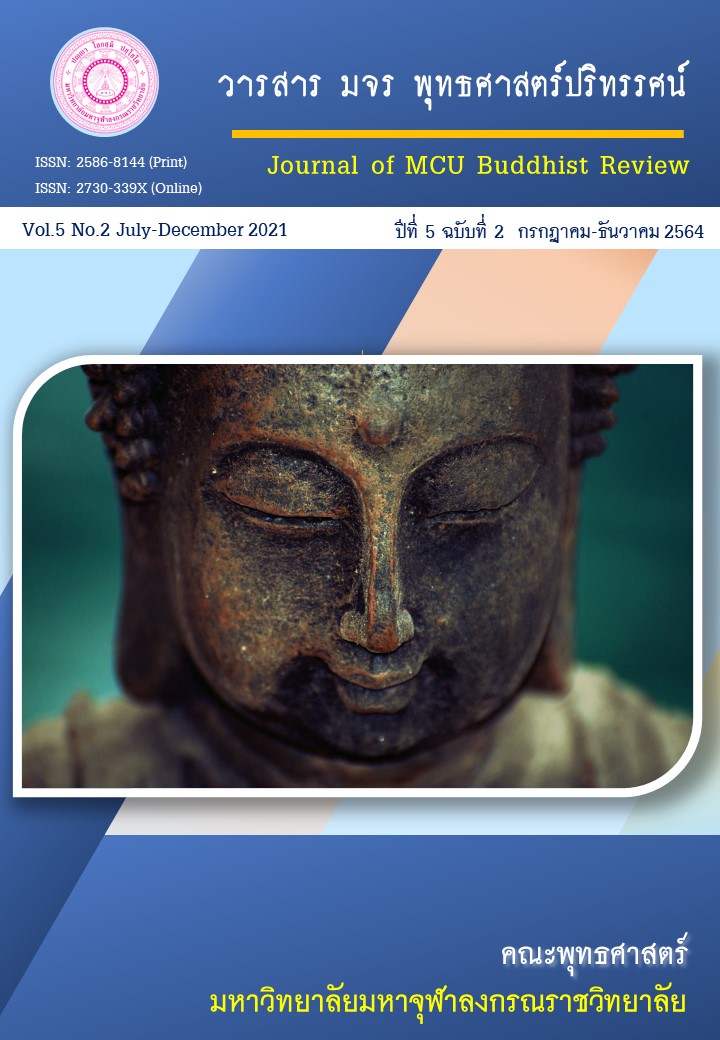ท่าทีอารยขัดขืนทางสังคมกับสถานะทางใจในพระพุทธศาสนาเถรวาท
Main Article Content
บทคัดย่อ
บทความนี้มีวัตถุประสงค์เพื่อศึกษาแนวคิดเรื่องอารยขัดขืนทางสังคมและสถานะทางใจ และวิเคราะห์อารยขัดขืนกับสถานะทางใจในพระพุทธศาสนาเถรวาท การศึกษานี้ใช้เอกสารทางวิชาการเป็นหลัก จากการศึกษาพบว่า อารยขัดขืนถูกเสนอผ่านลักษณะของการกระทำอันเป็นการแสดงออกถึงความไม่ยุติธรรมทางสังคม โดยการแสดงออกนั้นเป็นการขัดขืนต่อกฎหมายหรือแม้แต่การลงโทษก็ถูกมองว่าเป็นแค่เรื่องทางกายภาพไม่อาจทำร้ายจิตใจที่มุ่งมั่นต่อความยุติธรรมได้ ส่วนอารยขัดขืนผ่านการไม่กระทำ เป็นวิธีการใช้ความสงบและสันติวิธีเป็นหลักปฏิบัติ โดยปฏิเสธการร่วมกระทำในทุกกิจกรรมและใช้วิธีการอดอาหารทรมานร่างกายอันเป็นวิถีของนักบวชที่เน้นการฝึกจิตใจในการแสดงออก
สถานทางใจนั้นเกี่ยวข้องกับใจที่สั่งสมประสบการณ์และกลายเป็นตัวตนที่เชื่อมโยงกับการแสดงออก และใจที่เป็นเพียงสภาวะเท่านั้น เมื่อพิจารณาอารยขัดขืนกับสถานะทางใจในพระพุทธศาสนาเถรวาท จึงทำให้เกิดการเข้าใจถึงการกระทำนั้นว่าเป็นสิ่งเชื่อมโยงกันของจิตใจที่มีลักษณะตัวตนที่ยึดมั่นผ่านประสบการณ์ทั้งในอดีตและปัจจุบันจึงแสดงให้เห็นถึงแง่มุมความไม่ถูกต้องอันถูกตัดสินด้วยลำพังปัจเจกบุคคลเป็นหลัก ขณะที่การอารยขัดขืนผ่านการไม่กระทำ ดูจะเป็นไปตามหลักการที่พิจารณาจากใจว่า ไม่จำเป็นต้องแสดงออกมาภายนอก เนื่องจากการแสดงออกนั้นได้ถูกตีความผ่านกิเลสเป็นหลัก แต่หากไม่มีกิเลสก็ไม่จำเป็นต้องแสดงออก หรือหากจะแสดงออกก็จะถูกมองว่าเป็นไปในทางที่ถูกต้องและเหมาะสม
Article Details
- บทความที่ได้รับการตีพิมพ์เป็นลิขสิทธิ์ของวารสาร มจร พุทธศาสตร์ปริทรรศน์
- ข้อความใดๆ ที่ปรากฎในบทความที่ได้รับการตีพิมพ์ในวารสาร ถือเป็นความรับผิดชอบของผู้เขียนบทความ และข้อคิดเห็นนั้นไม่ถือว่าเป็นทัศนะและความรับผิดชอบของกองบรรณาธิการวารสาร มจร พุทธศาสตร์ปริทรรศน์
เอกสารอ้างอิง
กรุณา-เรืองอุไร กุศลาสัย. (2541). อมตวาจา ของ มหาตมา คานธี. พิมพ์ครั้งที่ 6. กรุงเทพมหานคร: แม่คำผาง.
ธเนศ วงศ์ยานนาวา. (2562). ว่าด้วยเอกเทวนิยม: เส้นทางของพระผู้เป็นเจ้าของจริง. กรุงเทพมหานคร: สมมติ.
พระมหาขวัญชัย เหมประไพ, พระครูวินัยธรสมุทร ทาทอง, พระมหาไกรวรรณ์ ชินทตฺติโย. (2564). มโนทัศน์เรื่องสิทธิเสรีภาพในพระพุทธศาสนาเถรวาท. วารสาร มจร พุทธศาสตร์ปริทรรศน์. ปีที่ 5 ฉบับที่ 1 มกราคม-มิถุนายน, 2564, 80-96.
มหาจุฬาลงกรณราชวิทยาลัย. (2539). พระไตรปิฎกภาษาไทย ฉบับมหาจุฬาลงกรณราชวิทยาลัย. กรุงเทพมหานคร : โรงพิมพ์มหาจุฬาลงกรณราชวิทยาลัย.
อรชุน อัปปาดูรัย. (2562). “ศีลธรรมแห่งการปฏิเสธ”. ศาสนากับความรุนแรง. บรรณาธิการโดย ปรีดี หงษ์สต้น และอัมพร หมาดเด็น. กรุงเทพมหานคร: ภาพพิมพ์.
ไอยรา สังฆะ, ประภาส ปิ่นตบแต่ง. (2556). ปฏิบัติการอารยะขัดขืน. วารสารมหาวิทยาลัยราชภัฏมหาสารคาม. ปีที่ 5 ฉบับที่ 3 กันยายน-ธันวาคม 2554: 153-166.
เฮนรี่ เดวิด ธอโร. (2563). ต้านอำนาจรัฐและความเรียงสามชิ้น. พิมพ์ครั้งที่ 2. แปลโดย พจนา จันทรสันติ. นนทบุรี: ภาพพิมพ์.
Fank A. Geldarad. (1963). Fundamentals of Psychology. London: John Wiley & Sons.
Jayatilleke. (2000). Facets of Buddhist Thought. Kandy: Buddhist Publication Society


